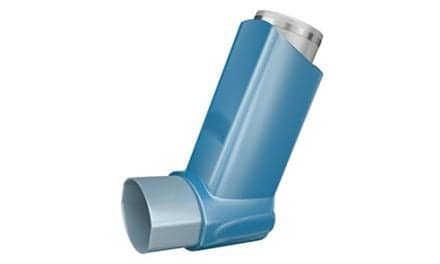The results of two phase 3 trials showed that a year’s course of benralizumab injections led to a significant decrease in the frequency of asthma exacerbations.
“Patients with severe, uncontrolled asthma have very few treatment options once they are already taking high-dose inhaled corticosteroids and long-acting beta agonists,” says Professor Eugene Bleecker, Centre for Genomics and Personalised Medicine, Wake Forest School of Medicine, Winston-Salem, NC, USA lead author of the SIROCCO trial. “Two drugs are currently approved for the treatment of severe, uncontrolled asthma (mepolizumab and reslizumab) but both target the IL-5 molecule directly, rather than the receptor. By targeting the IL-5 receptor, benralizumab depletes eosinophils directly, and our studies show that eosinophil counts were nearly completely depleted by week 4 of treatment.”
“The results from both trials indicate that benralizumab treatment once every 4 or 8 weeks decreased eosinophil counts, reduced asthma exacerbations, and improved lung function for patients with severe, uncontrolled asthma with eosinophilia” adds Professor J. Mark FitzGerald, The Lung Centre, Vancouver Coastal Health, University of British Columbia, Vancouver, BC, Canada, lead author of the CALIMA trial. “Additional therapeutic options to control severe asthma are urgently needed and our findings support the use of benralizumab as an add-on therapy for the treatment of severe asthma with persistent eosinophilia.”
The authors note that both trials show a strong placebo effect as rates of exacerbations decreased significantly in the placebo group who had an injection, but did not receive the drug. Patients in both trials were invited to join a two-year BORA safety extension study to provide data on longer-term use of benralizumab.
Writing in a linked Comment, Dr Mario Castro, Washington University School of Medicine, USA, compares benralizumab to mepolizumab and reslizumab and discusses the differences in the magnitude of effect in the two trials. He adds: “The CALIMA and SIROCCO studies also suggest that more frequent dosing initially followed by longer duration between treatments with an anti-interkeukin-5 monoclonal antibody should be investigated further. In these studies, in the Q8W dosing regimen, benralizumab was first given Q4W for 3 months probably to deplete eosinophils more rapidly in patients with high eosinophil tissue burden. Given the efficacy of Q8W dosing on exacerbations, symptom scores, asthma control, and quality of life, and the economical savings of using half the amount of drug suggests a potential advantage to this dosing regimen over Q4W dosing. Additionally, the less frequent dosing of anti-interleukin-5 might allow one to consider using these biologics earlier in the course of the disease, and in children.”









